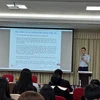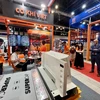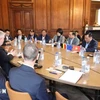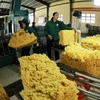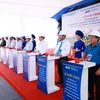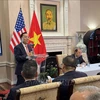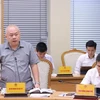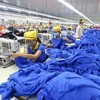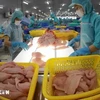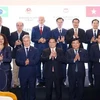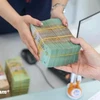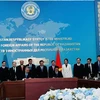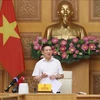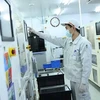Experts have suggested Government and State management agencies create a healthy investment climate for small- and medium-sized enterprises (SMEs) to compete in the 600-million-strong ASEAN market in anticipation of the year-end establishment of the ASEAN Economic Community (AEC).
They suggested speeding up administrative reform through the implementation of one-stop-shop customs procedures, simplifying required paperwork and facilitating the flows of vehicles and goods.
According to the 2014 Business Climate Report conducted by the World Bank and the International Finance Corporation, the average time spent on tax procedures in Vietnam was 872 hours for each SME annually, while 21 days are needed to complete export procedures and another 21 days for import procedures.
To improve the business climate, the Government has recently issued Resolution 19 to streamline procedures for enterprises to prepare, file and pay taxes in an average of 171 hours annually, in line with that of the ASEAN-6: Indonesia, Thailand, Singapore, the Philippines, Malaysia and Brunei. The time required for export and import procedures will be cut to 14 days and 13 days, respectively.
An The Dung, Office Chief of the inter-sectoral steering committee for economic integration said the Government could support businesses through implementing anti-dumping tax measures and building quality standards for products in line with the commitments of the World Trade Organisation (WTO) and other signed agreements.
Cao Sy Kiem, Chairman of the Vietnam Small-and Medium-Sized Enterprises Association, recommended enhancing business awareness of integration demands and building strategies based on their individual strengths.
The State should improve the business administration mechanism in accordance with international practices to help business confidence during integration, as well as assist them in human resources training and administrative procedures, he added.
An The Dung warned that the biggest hurdles to overcome are the quality of goods and services, investment attraction and trade protection measures.
Competition is expected to intensify after the formation of the AEC in late 2015, which will remove virtually all tariffs on goods traded between Vietnam and other ASEAN member nations, Dung said.
He called on businesses to make full use of opportunities resulting from the regional economic integration and requested joint supporting efforts from State-run management agencies and businesses to remove bottlenecks.
Small- and medium-sized enterprises account for up to 96 percent of the businesses operating in Vietnam.-VNA
They suggested speeding up administrative reform through the implementation of one-stop-shop customs procedures, simplifying required paperwork and facilitating the flows of vehicles and goods.
According to the 2014 Business Climate Report conducted by the World Bank and the International Finance Corporation, the average time spent on tax procedures in Vietnam was 872 hours for each SME annually, while 21 days are needed to complete export procedures and another 21 days for import procedures.
To improve the business climate, the Government has recently issued Resolution 19 to streamline procedures for enterprises to prepare, file and pay taxes in an average of 171 hours annually, in line with that of the ASEAN-6: Indonesia, Thailand, Singapore, the Philippines, Malaysia and Brunei. The time required for export and import procedures will be cut to 14 days and 13 days, respectively.
An The Dung, Office Chief of the inter-sectoral steering committee for economic integration said the Government could support businesses through implementing anti-dumping tax measures and building quality standards for products in line with the commitments of the World Trade Organisation (WTO) and other signed agreements.
Cao Sy Kiem, Chairman of the Vietnam Small-and Medium-Sized Enterprises Association, recommended enhancing business awareness of integration demands and building strategies based on their individual strengths.
The State should improve the business administration mechanism in accordance with international practices to help business confidence during integration, as well as assist them in human resources training and administrative procedures, he added.
An The Dung warned that the biggest hurdles to overcome are the quality of goods and services, investment attraction and trade protection measures.
Competition is expected to intensify after the formation of the AEC in late 2015, which will remove virtually all tariffs on goods traded between Vietnam and other ASEAN member nations, Dung said.
He called on businesses to make full use of opportunities resulting from the regional economic integration and requested joint supporting efforts from State-run management agencies and businesses to remove bottlenecks.
Small- and medium-sized enterprises account for up to 96 percent of the businesses operating in Vietnam.-VNA

